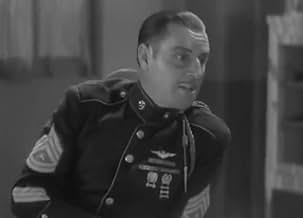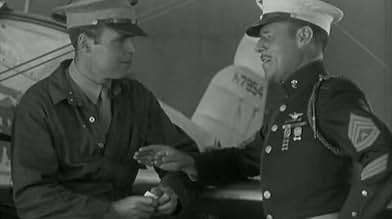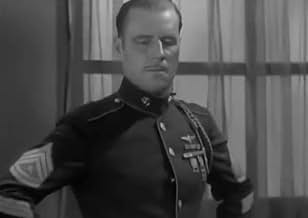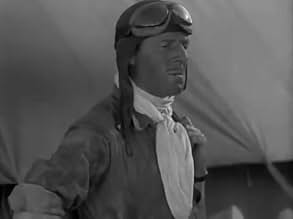अपनी भाषा में प्लॉट जोड़ेंA Marine flyer and his flight school mentor fall for the same beautiful nurse.A Marine flyer and his flight school mentor fall for the same beautiful nurse.A Marine flyer and his flight school mentor fall for the same beautiful nurse.
Harold Goodwin
- Steve Roberts
- (as Harald Goodwin)
Joe Bordeaux
- Marine
- (बिना क्रेडिट के)
Walter Brennan
- Marine Pilot
- (बिना क्रेडिट के)
Eddy Chandler
- Marine Sergeant - Panama's Buddy
- (बिना क्रेडिट के)
Edgar Dearing
- Football Coach
- (बिना क्रेडिट के)
George Irving
- Marine Colonel in Nicaragua
- (बिना क्रेडिट के)
फ़ीचर्ड समीक्षाएं
Frank Capra takes to the air in this rip off of William Wellman's silent Wings (27) but it never gets off the ground. Capra seems ill equipped to deal with aviation the way WW 1 pilot Wellman is and it shows early on.
Footballer Lefty Phelps makes headlines when he runs the wrong way (ala Roy "Wrong Way" Rigel's Rose Bowl gaffe) in the big game. Shamed beyond belief he joins the Marines after meeting the admirable Panama Williams who offers sympathy and advice. Phelps ends up training to be a pilot under Williams command but he washes out. He stays on in a non-pilot capacity and begins to romance Panama's desire Nurse Murray. Friction ensues between the two but there's a rebellion to fight in Central America and this enables Lefty to redeem himself.
Flight is at a disadvantage from the start due to progress-sound. 29 was a transitional year in sound and it hampers the action and performances. Because cameras were so noisy they had to be sound proofed, restricting movement. Actors were untested in voice and nuance when it came to sound and Capra regular Ralph Graves as Lefty sulking and lumbering about comes up short in both. Tim Holt's father fares far better and Lilla Lee sporting eye lashes as wide as the wings on Von Richthofen's Fokker is more Boop than Bara.
Capra's mise en scene and editing are pedestrian with actors poorly posed (once again to accommodate the microphone) and reacting foolishly to off screen action. There are some decent air acrobatics and a striking approach shot to an enemy fortress but special effects are glaringly poor in spots and overall it remains inferior in every aspect to Wings and thus reaffirms that Silents are golden, especially when its accompanied by a rousing pipe organ score.
Footballer Lefty Phelps makes headlines when he runs the wrong way (ala Roy "Wrong Way" Rigel's Rose Bowl gaffe) in the big game. Shamed beyond belief he joins the Marines after meeting the admirable Panama Williams who offers sympathy and advice. Phelps ends up training to be a pilot under Williams command but he washes out. He stays on in a non-pilot capacity and begins to romance Panama's desire Nurse Murray. Friction ensues between the two but there's a rebellion to fight in Central America and this enables Lefty to redeem himself.
Flight is at a disadvantage from the start due to progress-sound. 29 was a transitional year in sound and it hampers the action and performances. Because cameras were so noisy they had to be sound proofed, restricting movement. Actors were untested in voice and nuance when it came to sound and Capra regular Ralph Graves as Lefty sulking and lumbering about comes up short in both. Tim Holt's father fares far better and Lilla Lee sporting eye lashes as wide as the wings on Von Richthofen's Fokker is more Boop than Bara.
Capra's mise en scene and editing are pedestrian with actors poorly posed (once again to accommodate the microphone) and reacting foolishly to off screen action. There are some decent air acrobatics and a striking approach shot to an enemy fortress but special effects are glaringly poor in spots and overall it remains inferior in every aspect to Wings and thus reaffirms that Silents are golden, especially when its accompanied by a rousing pipe organ score.
I recently saw this on Turner Classics. I had never seen this film from the early days of talking pictures before. Adding to its historic value is that it's directed by legendary Frank Capra from early in his career. Actor Ralph Graves who plays Lefty Phillips wrote the story, using two unrelated actual current events of the day to bookend his story; a wrong-way run in the Rose Bowl and a rogue general in Nicaragua. The Phillips character is based on Roy 'Wrong Way' Riegels who played for Cal-Berkeley against Georgia Tech in the 1929 Rose Bowl. He picked up a fumble, was spun around and ran 65 yards the wrong way before being stopped short of the opponent's goal. Lefty is distraught by the humiliation and goes on to join the Marines Navy Air Corps. Riegels would later join the Army Air Corps in WWII so it's kind of like art imitating life and then life imitating art. Jack Holt is Sgt. Panama Williams who trains the pilots. Lila Lee is nurse Elinor Murray, the love interest of both Panama and Lefty. Panama, Lefty and Elinor are all sent to Nicaragua where a rogue general and his guerrilla army have killed US Marines stationed there. In reality US Marines were in Nicaragua from 1927 to 1933. Small individual armies roamed the country and the US government was instituting a unified national guard and set up Anastasio Somoza Garcia to run it. General Augusto César Sandino was a guerrilla leader who's forces fought against the US Marines for five years. In this ficitonalized account of that conflict, Sandino is a character named Lobo played by Jimmy de la Cruze. Elmer Dyer who shot the aerial scenes for such Films as Hell's Angels, Lost Horizon, The Dawn Patrol and Air Force is the principal Ariel photographer on this film and Joe Novak and Joseph Walker are cinematographers. Howard J. Green wrote the screenplay from Graves' original story with additional dialogue from director Capra. Holt had the most successful and long- lived film career of the three lead actors. An established silent film star, he smoothly made the transition to sound films and had a long career in b-westerns and crime movies. Graves was a silent film actor who's continued success was limited to the 1930's. He made a couple films in the 40's in minor roles and then his career was over. Lee was at the peak of her career here having made 11 films in 1928, 9 in 1929 and 6 in 1930 before her career began to taper off. She was a promising silent film actor who never lived up to the expectations the studio had for her after making the transition from silents to sound. This isn't a great film. It's kind of silly and awkward at times but it's well done and fun to see a Capra film just seven years into his directorial career and the film has it's early sound and early aviation historic value. It's worth a look. I would give it a 6.5 out of 10.
The film is about two pilots--one who is the veteran flight instructor at Pensacola Naval Air Station (Tim Holt) and the other is a man who desperately wants to earn his wings, but he's terribly unsure of himself (Ralph Graves). Over time, a friendship develops between them that is challenged when both men fall for the same Navy nurse.
While all this might seem a bit predictable and clichéd, for 1929 it was pretty good stuff. Plus, all the familiar story elements contained in the film were NOT clichés, as this film introduced many of these items that would later become standard plot lines. Plus, the film is aided by excellent flying scenes and some amazingly fun and witty dialog every now and again. Graves made several comments that had me laughing. Because of this and the easy-going banter between them, this was a very likable film--particularly for nuts like me that adore early aviation films. The film abounds with great footage of aircraft and is a must-see for aviation fans.
By the way, the team of Graves and Holt made quite a few early military-inspired films for Columbia--making them the first stars for this fledgling studio. In addition to Marine pilots like they were in this film, they also starred in other films about US military (such as DIRIGIBLE, A DANGEROUS AFFAIR, FLYING FLEET and SUBMARINE). Oddly, despite their success, by 1931-1932, their careers as leading men were pretty much over.
One negative about the film is the sound quality. Though it does improve later in the film, FLIGHT is terribly in need of restoration as some of the dialog is very, very difficult to understand--a rather common problem with films from the early sound era. Closed captioning would have been nice, but was not included.
While all this might seem a bit predictable and clichéd, for 1929 it was pretty good stuff. Plus, all the familiar story elements contained in the film were NOT clichés, as this film introduced many of these items that would later become standard plot lines. Plus, the film is aided by excellent flying scenes and some amazingly fun and witty dialog every now and again. Graves made several comments that had me laughing. Because of this and the easy-going banter between them, this was a very likable film--particularly for nuts like me that adore early aviation films. The film abounds with great footage of aircraft and is a must-see for aviation fans.
By the way, the team of Graves and Holt made quite a few early military-inspired films for Columbia--making them the first stars for this fledgling studio. In addition to Marine pilots like they were in this film, they also starred in other films about US military (such as DIRIGIBLE, A DANGEROUS AFFAIR, FLYING FLEET and SUBMARINE). Oddly, despite their success, by 1931-1932, their careers as leading men were pretty much over.
One negative about the film is the sound quality. Though it does improve later in the film, FLIGHT is terribly in need of restoration as some of the dialog is very, very difficult to understand--a rather common problem with films from the early sound era. Closed captioning would have been nice, but was not included.
One of several attempts to talk-up William A. Wellman's high flying "Wings" (1927) **********. This time, the leading threesome form the more traditional triangle of love -- younger Marine pilot Ralph Graves (as Lefty Phelps) and his mentor/Sergeant Jack Holt as (Panama Williams) are in both love with lovely nurse Lila Lee (as Elinor Murray). Ms. Lee loves Mr. Graves (in a romantic way). Mr. Graves loves Lee (in a romantic way) and Mr. Holt (in a fatherly way). Circumstances put the characters' relationships in turmoil, and danger
An interesting early effort by director Frank Capra; but, of course, it is nowhere near his best. Harold Goodwin has a great supporting role (as Steve Roberts). Graves and Holt are a reliable team. Graves seems a little younger and Holt a little older than they appear; the actors are about the same age, however; and, they have a nice rapport.
Watch for a scene right after the "stuck in the mud" segment concludes -- in their tent, Holt scolds Graves for wanting to go out and get "tight"; he tries to pull his pal's shirt off, but Graves resists. Then, the men wrestle, which ends up with Holt pulling Graves' legs up to give him a spanking! As a bonus, Graves' hairpiece almost flips off his head!
An interesting early effort by director Frank Capra; but, of course, it is nowhere near his best. Harold Goodwin has a great supporting role (as Steve Roberts). Graves and Holt are a reliable team. Graves seems a little younger and Holt a little older than they appear; the actors are about the same age, however; and, they have a nice rapport.
Watch for a scene right after the "stuck in the mud" segment concludes -- in their tent, Holt scolds Graves for wanting to go out and get "tight"; he tries to pull his pal's shirt off, but Graves resists. Then, the men wrestle, which ends up with Holt pulling Graves' legs up to give him a spanking! As a bonus, Graves' hairpiece almost flips off his head!
The plot is certainly familiar from many other movies, notably "Tell it to the Marines". The old timer versus the cheeky new recruit. And of course the girl that the sergeant wants is actually in love with the recruit, who feels rotten about it because the sergeant has been so nice to him. But the characters are interesting, particularly Jack Holt's,the camaraderie is nice to watch and there is plenty of action, flying scenes and battle scenes,fascinating shots of old time airplanes, all of which make this a fun movie to watch, which after all is the important thing in a movie of this type.Very pleasant entertainment in spite of the sound problems.
क्या आपको पता है
- ट्रिवियाThe wrong-way run was based on the infamous play by Roy Riegels of the University of California in the 1929 Rose Bowl. With the score 0-0 in the second quarter, Riegels recovered a Georgia Tech fumble at the Yellow Jackets' 30, but he somehow got turned the wrong way and ran 65 yards toward his own goal line. A teammate grabbed him, but he was dropped at his own 1. The Golden Bears elected to punt, the punt was blocked out of the end zone for a safety touch and the two points provided the margin of victory in Georgia Tech's 8-7 win. The movie uses actual footage of Riegels from the game.
- गूफ़When Lefty Phelps is polishing an aircraft, Sergeant Williams calls to him by yelling "Hey, soldier!" As both men are US Marines, the sergeant would not have addressed him that way. Soldiers are members of the US Army and a Marine would actually consider that remark to be an insult.
- भाव
Steve Roberts: [On the Nicaraguan rebels] You know damn well what's going to happen if these people come along and catch you alive.
- कनेक्शनFeatured in Frank Capra, il était une fois l'Amérique (2020)
- साउंडट्रैकMy Mammy
(1921) (uncredited)
Music by Walter Donaldson
Lyrics by Sam Lewis and Joe Young
Sung a bit a cappella by Ralph Graves
टॉप पसंद
रेटिंग देने के लिए साइन-इन करें और वैयक्तिकृत सुझावों के लिए वॉचलिस्ट करें
विवरण
- रिलीज़ की तारीख़
- कंट्री ऑफ़ ओरिजिन
- भाषा
- इस रूप में भी जाना जाता है
- Kartalların Avdeti
- फ़िल्माने की जगहें
- उत्पादन कंपनी
- IMDbPro पर और कंपनी क्रेडिट देखें
- चलने की अवधि1 घंटा 50 मिनट
- रंग
इस पेज में योगदान दें
किसी बदलाव का सुझाव दें या अनुपलब्ध कॉन्टेंट जोड़ें




























